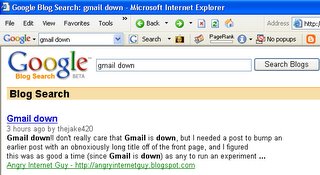Gmail down
Gmail down!
I don't really care that Gmail is down, but I needed a post to bump an earlier post with an obnoxiously long title off of the front page, and I figured this was as good a time (since Gmail is down) as any to run an experiment about the effectiveness of Googlebombing and keyword stuffing. Let's see if we can get to the top of Google's blogsearch tool within one day.
Have you ever felt down about Gmail? Maybe Gmail isn't working one day and you cannot access it, and maybe you even get a Server Error message on your screen saying something like: Gmail is temporarily unavailable. Cross your fingers and try again in a few minutes. We're sorry for the inconvenience.
Wouldn't that make you sad? After all, if Gmail is down, and the server is unavailable, then doesn't that mean that you have to either cross your fingers and try again later or use an alternate email service?
I wonder if I just keep talking mindlessly about the fact that Gmail is down, if I' ll end up on the top of http://blogsearch.google.com or if something else will end up as number one for the phrase Google is down (since after all, Google is down...)
UPDATE:
I'm number 1 on blogsearch.google.com for the phrase "Gmail down" after only a few short hours.
Well, obviously Google's blogsearch uses a different algo than Google "proper", not to mention the fact that they spider Blogspot entries extremely quickly after they are created. (Which makes sense, as Google owns Blogspot.)
While this experiment is not intended to point out the flaws inherent in psuedo-realtime relevancy-based SERPs, it does make one thiing glaringly obvious... Google isn't perfect. Close, but not quite. ;)
This experiment was based on other similar experiments in the past which have tracked the results of Googlebombing and other similar "bad" methods of getting towards the top of the SERPs.
So, what CAN we learn from this? There are several lessons to be learned here, not the least of which is that if you don't have a blog that is in some way connected to your website, get one. It's a lot easier to get to the top of blog-only SERPs than to the top of mainstream SERPs. Why? Because, to put it simply, there isn't as much competition.
Mainstream websites, particularly the larger ones, tend to have people who know what they're doing, or at the very least, people who read up on "what to do" to get decent search engine rankings in various websites and forums such as http://www.webmasterworld.com (an excellent resource, by the way...)
Blogs, on the other hand, are primarily created by "real people" with little to no SEO training. They don't know the difference between putting a headline in an H1 tag and simply making the font size larger. This gives people like me (mainstream webmasters) a distinct advantage, because we should already know how to optimize a page for maximum Search Engine placement.
What else does this teach us? Keyword density is VERY important. If I had used the phrase "Gmail is down" just once or twice in my article, it would have been stuck with all of the other blogs that happened to mention that something about Gmail being down today, and wouldn't necessarily have gotten a top ranking, since they all would have used the phrase "Gmail is down" once or twice in their articles as well.
Note that simply using the phrase multiple times is not good enough. I intentionally used the phrase in various ways (Headline was "Gmail down", one of my links had the anchor text "Gmail is down", and I used the phrases "Gmail is down" and "Feeling down about Gmail?" throughout my text in a very natural sounding way... and not over and over. I had to force myself to limit the use of the phrase (and variations) to only a handful of times.
Also, I made sure that there was enough text surrounding these target phrases so that it gave the appearance of being used "normally" and not "with the sole intention of getting a #1 ranking on Google for this phrase". Google isn't perfect, but it isn't stupid either. If you're blatantly cheating, it'll usually catch you. In this case, despite the fact that my article was actually about Google's results, the phrase "Gmail is down" was actually relevant enough to the search engine that it ranked it number 1.
What else?
Links pointing to the page were also part of my system... note, however, that I linked my entry's title text to the front of the blog page (where this article happens to be located as of the time of this writing), assuming that Google would give a little more weight to the title of the blog entry, which it apparently did.
You don't want to overdo this, or Google will discount the value of these links, but when Title text is used appropriately, it can be invaluale. The same thing that applies to the TITLE tag in an HTML document applies here, based on the theory that the title must have something to do with what the article (or page) is about.
PS - I'm available for SEO work. I'm expensive, but I'm good. I have hundreds (probably thousands) of #1, or at least "top 10" listings on Google, between my various sites.


















0 Comments:
Post a Comment
<< Angry Internet Guy Home